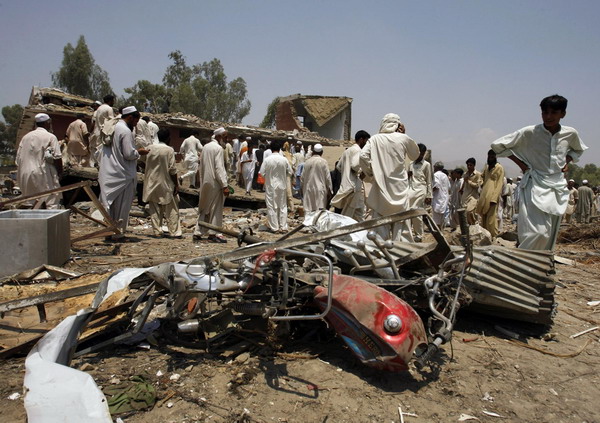Asia-Pacific
Suicide bombers kill 62, wound 111 in Pakistan
(Agencies)
Updated: 2010-07-09 23:29
 |
Large Medium Small |
KHAR, Pakistan - A pair of suicide bombers struck outside a government office Friday in a tribal region where the army has fought the Taliban, killing 62 people and wounding 111 in one of the deadliest attacks in Pakistan this year.
|
 A boy stands over a destroyed motorcycle at the site of a suicide bomb blast in Pakistan's northwestern Mohmand region July 9, 2010. A suicide bomber on a motorbike killed at least 56 people, including women and children, and wounded dozens in the attack in the volatile Pashtun region on the border with Afghanistan on Friday, officials said. [Agencies]
|
The attack, possibly aimed at some anti-Taliban tribal elders, showed that Islamist militants remain a potent force in the northwest tribal belt bordering Afghanistan, despite army offensives and US missile strikes aimed at wiping them out. Washington is watching closely how Pakistan handles its militant crisis, pushing the South Asian country to wage war on Taliban and al-Qaida fighters who use its territory to plan attacks inside Afghanistan.
Some 70 to 80 shops were damaged or destroyed, while damage to a prison building allowed 28 prisoners - ordinary criminals, not militants - to flee, Rasool Khan said. One of the bombs appeared fairly small but the other was huge, and they went off within seconds of each other, officials said. At least one bomber was on a motorcycle.
Video footage showed dozens of men searching through piles of yellow brick and mud rubble for survivors. Women and children were among the victims.
Near the attack site, officials had been distributing wheelchairs to disabled people and equipment to poor farmers, Amjad Ali Khan said. It was unclear how many participants in that event were among the victims.
Khan disputed reports that the aid was provided through US funding, saying it came from Pakistani government funds. However, US Embassy spokesman Rick Snelsire confirmed that, on the previous day, Pakistani staff from a Washington-based contractor that receives USAID money had been giving out farm equipment in the village.
The staff of that contractor, AED or Academy for Educational Development, are staying in the area, but are not believed to have been the targets Friday.
Rasool Khan said 62 people died and 111 were wounded, making it the deadliest attack in Pakistan since a team of gunmen and suicide bombs stormed two mosques of the Ahmadi sect in the eastern city of Lahore, killing 93 people in late May. That was one of a series of several deadly strikes in Punjab this year.
Abdul Wadood was sitting in a vehicle in Yakaghund when the attack happened.
"I only heard the deafening blast and lost consciousness," said the 19-year-old, who was being treated for head and arm wounds in Peshawar, the main city in the northwest, about 15 miles (25 kilometers) away from the attack. "I found myself on a hospital bed after opening my eyes. I think those who planned or carried out this attack are not humans."
Security official Esa Khan said the sounds were deafening.



